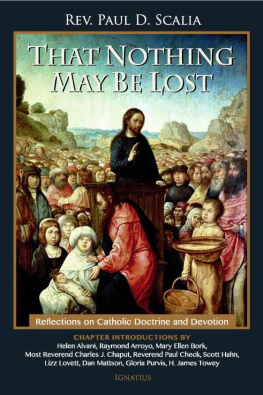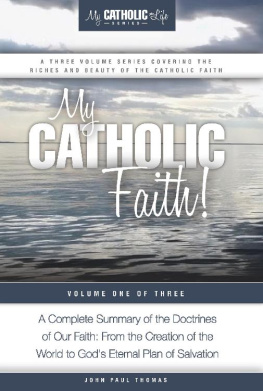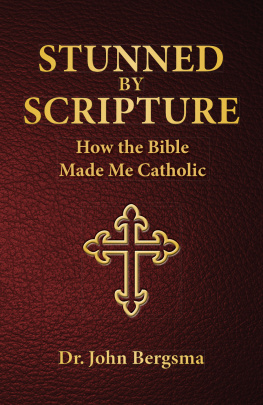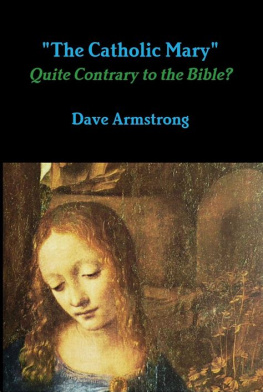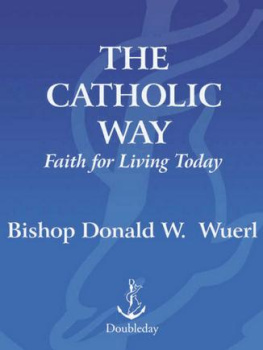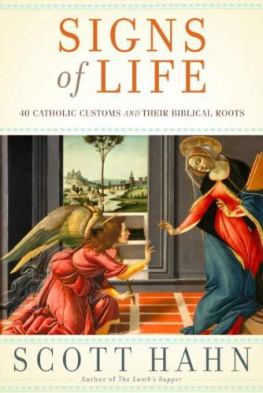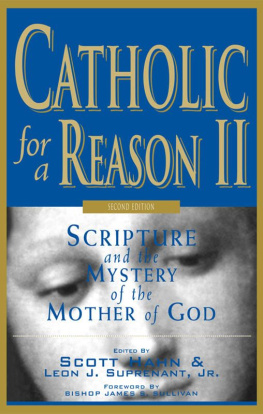THAT NOTHING MAY BE LOST
Rev. Paul D. Scalia
That Nothing May
Be Lost
Reflections on Catholic
Doctrine and Devotion
IGNATIUS PRESS SAN FRANCISCO
Unless otherwise indicated, Scripture quotations are from Revised Standard Version of the BibleSecond Catholic Edition (Ignatius Edition) copyright 2006 National Council of the Churches of Christ in the United States of America. Used by permission. All rights reserved worldwide.
Cover art:
Multiplication of the Loaves and Fishes . 1505
Palacio Real, Madrid, Spain
Photo credit: Album / Art Resource, N.Y.
Cover design by Riz Boncan Marsella
2017 by Ignatius Press, San Francisco
All rights reserved
ISBN 978-1-62164-150-6 (PB)
ISBN 978-1-68149-757-0 (EB)
Library of Congress Control Number 2016956072
Printed in the United States of America
CONTENTS
FOREWORD
One of my favorite sayings over the many years of my ministry is this: there is no presence of Jesus in the world without the Church, no Church without the Eucharist, no Eucharist without the priestand no priest without good Christian men and women who raise their sons to listen for Gods calling. The story of salvation is the story of a family of vocationslay, priestly, and religiouseach needing and supporting the other on the pilgrim way to heaven. The wonderful book of essays and thoughts you now have in your hands is part diary and part guide on that road we all share.
Christian life requires a willingness to love. And I dont mean love, the theory, or love, the warm feeling. I mean love, the act of will, the act of courage. Real love is always expensive. Real love is always anchored in the truth about ourselves and about others. And while the truth will make us free, nobody said it would make us comfortable. The truth is that the world is a sinful place, and were part of that sinfulness.
This is why God sets His Chosen People apart in Baptism. This is why He sets His priests apart in the Sacrament of Holy Orders. In a way, all Christians are caught in a seeming dilemma, between the stars God calls us to reach for, and the clay were made of. God asks us to acknowledge all of our many sins, but then He insists that we trust in His love anyway, believe in our dignity anyway, follow Him anyway, and sanctify the world anyway. And that means that if we try to do what seems so improbableto love as Jesus lovedwere going to struggle and sometimes fail, and in failing, well experience the disdain of the world.
So it has always been. When the prophet Isaiah tells us that the Spirit of God has anointed him to bind up the brokenhearted, to proclaim liberty to the captives, and the opening of the prison to those who are bound (Is 61:1), he doesnt talk about the cost, because hes consumed with the reward of serving Godand rightly so. But Isaiah was also a sinner like the rest of us, and from the Scriptures we know that people rejected him the same way they rejected every other prophet.
The cost of discipleship can be high. Real love is always beautiful but also humbling. It asks us to listen to the needs of others and to choose whats best for them first. It asks us to admit our sins and repent of them, but it also offers the solace that we not be deterred by them. This is why discipleship is not for the fainthearted, and Christian life is an adventure meant for the brave. God needs people of selflessness and character. God needs men and women who will help Him remake the world, who will allow Him to make them into a holy people, something more than what they are without Him.
The Bible has dozens of dramatic moments, but the one that arguably matters most is from Luke 4:16-21, where Jesus identifies Himself and His mission with that same powerful passage of Isaiah 61:1: The Spirit of the Lord is upon me, because he has anointed me to preach good news to the poor... [and] to set at liberty those who are oppressed.... Today this Scripture has been fulfilled in your hearing (Lk 4:18, 21). If human history has a center, this is it. If Scripture has a direction and meaning, this is it. All of Gods contact with humanity either leads up to this point or flows from it. As C.S. Lewis once famously observed, in speaking these words Jesus is either stating a fact or Hes blasphemingor Hes mentally ill. There is no middle ground. And the people in the synagogue, who heard Him say the words, understood this very wellwhich is why they turned against Him.
Of course, Jesus was merely stating the truth, and His radical claim begs for a radical response. The Apostles and many others who followed Him reconfigured their lives and risked or gave away all that they owned. Joy and fruitfulness come from this kind of discipleship, but it asks from us a life of conscious focus and openness to Gods Word.
The people who carried the Catholic faith forward in history, who made the culture of beauty, music, art, and architecture rooted in the Christian understanding of God and humanitythese generations were taught, spiritually fed, and shaped by priests exactly like the men who minister to us in our local Church, men not so different from the one who wrote this book. Where there is Catholic faith anywhere in the world, it exists because priests offered their lives for the sake of Jesus Christ and the people God called them to serve.
Today, Jesus asks each of us, not just those of us who are priests, to be His Fathers word becoming flesh through the witness of our lives. Its through our witnessdespite all our failures but guided, lifted up, and encouraged by our pastors who share our same strugglesthat Christ sanctifies the world. When people see and hear us, they should see and hear Jesus Christ; and through Jesus, they will encounter the Father who loves them despite their sins, and our sins.
Father Scalia has written a book that deepens our faith and leads us closer to God in a hundred different ways. His good work and the powerful witness in his words remind us that we need each others love and support as brothers and sisters in the Lords work. Above all, its proof that the bond of Christian people and their priests is the strength of the Church in a skeptical world that has never needed the Word of God more urgently.
+Charles J. Chaput, O.F.M.Cap.
Archbishop of Philadelphia
INTRODUCTION
Gather up the Fragments Left Over,
That Nothing May Be Lost
Only one miracle is recorded by all four Gospels: the multiplication of loaves and fish (Mt 14:13-21; Mk 6:30-44; Lk 9:11-17; Jn 6:5-13). That unique unanimity alone signals the importance of the event. The miracle is indeed full of significance. By way of it our Lord shows Himself to be the new Moses, Who feeds the People of God with Bread from heaven; He reveals that He is the Messiah, Whom the crowds want to make king (see Jn 6:15); and He points us to the Eucharist, the true Bread from heaven. But for the purposes of this introduction, allow me to linger over two details of lesser importance.
First, Saint Mark tells us that when Jesus came to that deserted place and saw the crowds he had compassion on them, because they were like sheep without a shepherd; and he began to teach them many things (Mk 6:34; cf. Mt 9:36). We might find our Lords response a little strange. Teaching many things does not strike us as a good way to respond to a vast, needy crowd. It seems odder still because we know the miracle that follows. Why pause and teach them anything? Why not cut to the chase and give them the food they need? Action is always better than dialogue, right?
Jesus knows what He is about. He is moved with pity for the crowds because they are, as we hear through the prophet Hosea, destroyed for lack of knowledge (Hos 4:6). It is not their physical but their spiritual hunger that moves His heart. Nor does He mourn the absence of knowledge as we typically think of it: the scientific, technical knowledge valued by the world, the shrewd knowledge about markets and how to get ahead. He mourns, rather, the lack of that deeper, more important knowledgeabout where we come from, why we are here, and where we are going; about Who God is, what He has done for us, and that He loves us; about how we can be forgiven, healed, and saved.
Next page
